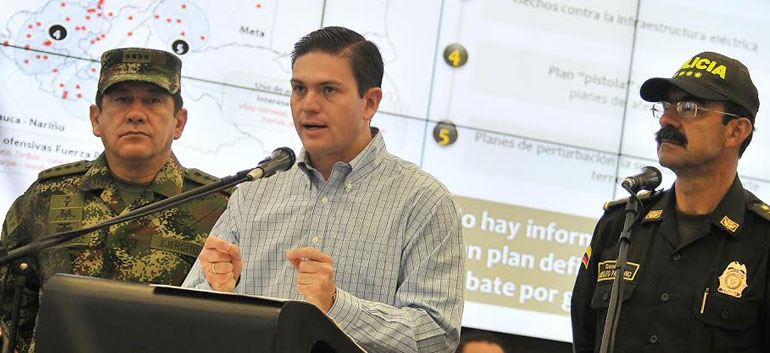Colombia’s minister of defense reported Sunday morning that the 2014 presidential elections have commenced peacefully, without any attacks from armed groups.
Minister Juan Carlos Pinzon announced that the elections have taken place in a “climate of normality,” and unlike in other years, have so far not seen any attacks by armed groups.
“A 100% decrease of actions from illegal armed groups has been recorded, in reference to the year 2010, when 19 attacks were recorded,” said Pinzon.
As it did during congressional elections last March, the Ministry of Defense has deployed additional security forces across the country in anticipation of Sunday’s polling process, which opened at 8AM. But the thus-far peaceful election process this year has also been made possible by a unilateral ceasefire enacted by Colombia’s two largest guerrilla groups, the FARC and ELN.
MORE: Rebel groups enact ceasefire ahead of Colombia presidential elections
The ceasefire began last Tuesday and is scheduled to last until May 28. The explicit intention is to allow Colombians to “vote in an atmosphere of peace and tranquility for the first time in decades,” according to national newspaper CM&.
Other security measures ensuring the peace include the mobilization of 400,000 members of the police and army covering a reported 99.9% of the voting booths nationwide.
A countrywide ban on alcohol and firearms was also put into place Saturday night and will continue through Monday morning to ensure a peaceful election process.
MORE: Colombia enacts alcohol ban, prohibits firearms during election weekend
So far, 232 people have been arrested for various offenses while 117 firearms have been confiscated for being carried illegally, according to the Ministry of Defense.
In all, 2,581 commercial establishments have been inspected while 47 were shut-down for violating the so-called dry law, resulting in the arrest of 21 store operators.
MORE: Alleged homemade FARC bomb found on election day in rural Colombia
Although no attacks from rebel groups have occurred, a bomb allegedly planted by the FARC was found at a hydroelectric construction project; the homemade device, however, was not placed in the vicinity of any polling stations, and no damages or injuries were reported.


